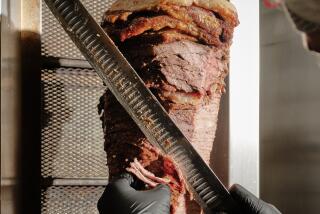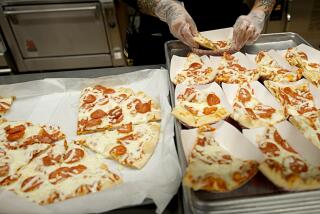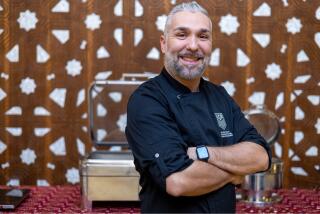The Chow’s a Mess, Troops Complain : Desert Shield: It’s hot, it’s dull, it’s swarming with flies, but what’s really eating them is the food.
- Share via
EASTERN SAUDI ARABIA — The Army manual for desert warfare says food and water are tactical weapons. In the mess halls of Operation Desert Shield, troops gripe about whether the food weapon is aimed at them or the enemy.
These food critics are anything but diplomatic.
“Disgusting,” said Marine Lance Cpl. Dale Sturdifan, 20, of Petersburg, Va., carrying a breakfast plate of watery scrambled eggs, rice, a meat patty, bread, apple juice and a cookie back to his quarters.
No topic, even the desert heat, gets more growl time in the foxholes and billets than chow.
Although it’s a sure bet no American army has ever eaten better, the soldiers in Saudi Arabia have raised complaints about the cuisine to new heights.
Air Force Sgt. Mike Phillips, 29, of Newbury, Ohio, said he’s lost 20 pounds since he arrived. Phillips has a simple rule: “If you can’t identify it, don’t eat it.”
Almost all troops, even the Marines dug in closest to the Kuwaiti border, get hot meals for breakfast and dinner.
One type is the Army version of the TV dinner. It’s prepackaged and heated in hot water.
When hot food isn’t available, troops turn to a staple called “Meals, Ready-to-Eat,” or MREs in soldierspeak.
Some soldiers say MREs stand for “Meals Rejected by Everyone Else.” An improvement on canned rations such as Spam and cheese, each MRE comes in a chocolate-brown wrapper as a 2,500-calorie, prepackaged portion that can be eaten anywhere.
The dishes include pork patties, meatballs with barbecue sauce, chicken a la king, ham omelet and frankfurters with beans. Other goodies in the packets include crackers, peanut butter, a candy bar, instant coffee and flavoring for water.
“To look at them just makes me ill. I’ll eat the crackers and peanut butter but that’s about as far as I’ll go,” said Air Force Maj. Carol Darby, 34, of Roseville, Calif.
MREs are one of the most nutritionally complete food packages in the world, claims Gerald Darsch, chief of the food technology division at the Army’s research labs in Natick, Mass.
The Army’s Research Institute of Environmental Medicine takes food seriously.
“Soldiers must be taught that food and water are tactical weapons. Soldiers must be taught to eat and drink, whether they like it or not, whether they are hungry or thirsty or not,” the regulations say.
Being in a desert swarming with flies doesn’t help. One Marine company has an informal rule that it’s wasted energy to shoo away the pests unless there are more than three on a fork at a time.
Some service personnel eat better than others.
One recent Air force breakfast included real eggs instead of powdered ones, bacon--a delicacy in porkless Saudi Arabia--French toast with syrup, grits, chipped beef, hash browns, fresh fruit, orange juice and hot coffee.
A Marine dinner was chili with rice, cooked vegetables and a Twinkie. The server’s last words as he put a portion on a plastic plate were, “Nice knowing you.”
More to Read
Sign up for Essential California
The most important California stories and recommendations in your inbox every morning.
You may occasionally receive promotional content from the Los Angeles Times.













